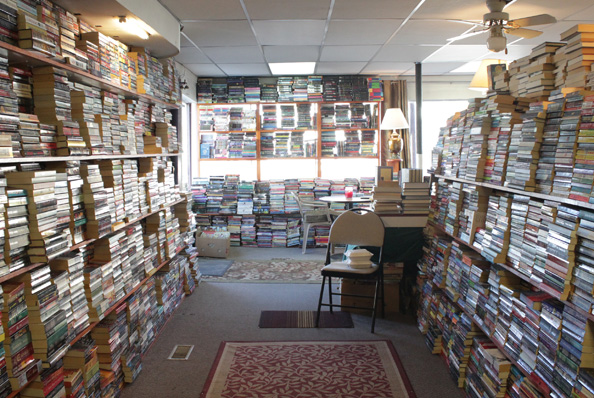
“This is a story that happened over a month or so ago. Two university students came in… I thought she had just transferred into Trent but it turns out, first of all, she was about to graduate after three or four years here. This was her first time in the store, and she said that it was on her Peterborough bucket list to go into a used bookstore.”
– Mark Jokinen
Peterborough’s used bookstores are plentifully concentrated in the downtown core. They used to be a helpful institution for students to use in order to get steeply discounted books rather than pay the full price for new books at the university bookstore.
Today, these used bookstores are missing their usual population of student buyers due to a plethora of reasons. The reality is now that used bookstores may be a novelty found on student bucket lists and not a regular part of the beginning of the school year.
It makes for a wonderful district for the pedestrian bibliophile all located within a five-block radius of each other. The shops include: Mark Jokinen Books, Knotanew Books, Scholars’ Bookstore, Thea’s Books & Violins, Books ‘N’ Things, and Dixon’s Bookstore. Notwithstanding Peterborough’s concentrated district for booksellers, these book shops are not in competition.
The differentiation of bookstores ensures that they are in business for decades and not months by offering different products.
While these shops have steady business from other demographics in the city, these booksellers have noticed a distinct downward trend in the number of Trent students patronizing their stores.
In discussing the trends with shop owners, we speculated upon the various reasons this may be occurring. Are students reading less? Are they reading different media? Has academia transferred largely to the Internet? Is the larger economic downturn to blame for decreasing sales?

In no small part, the decreasing presence of the university downtown has a role to play in Peterborough’s situation. In 1999, the university bookstore was located on Charlotte St. and it was a hub for students living on campus and downtown to shop downtown. The closing of Peter Robinson College in 2003 further decreased Trent’s presence downtown. And lastly, the decision to build Gzowski college on the Symons campus and not downtown contributes to the sequestering of Trent uptown.
Paul Dyment, owner of Scholars’ Bookstore, compares the Peterborough-Trent situation to the Kingston-Queen’s community.
The integration of Queen’s University into the downtown core has created a vibrant bustling community, Dyment says. By bringing the students downtown, not only to live but also to take classes, leads to the integration of students into the regular hustle and bustle of the city.
While a significant number of Trent students live in the downtown core, it is not only proximity that determines the number of students filing through bookstores.
Mark Jokinen, owner of Mark Jokinen Books, attributes this phenomenon to the increasing tendency for professors to use online media, this coupled with the university bookstore’s monopoly on course materials. Jokinen sells used textbooks to students but has found that in recent years sales have dwindled.
Increasing use of online journal articles and e-books in classes is leading to a diminishing market for used university books.
Students and professors can be put off by the exorbitant prices of the bookstore and of academic materials leading to alternative solutions that eliminate these instruments entirely. Moreover, for those courses which require physical books, the university bookstore runs programs to buy back used textbooks, thereby taking much of the books that could have gone to local stores out of the market.

In spite of this lost demographic, Peterborough’s booksellers find creative ways to stay in business. For instance, William Van Nest, owner of Trillium Antiquarian Books, does the bulk of his business online. He purchases, repairs, and resells antiquarian books through his online marketplace.
While not a competitor of the online bookselling giants Chapter and Amazon, Trillium Books caters to the niche but global market of antiquarian book collectors.
Peterborough’s book community is lively and welcoming but has lost its student engagement, as I found meeting with the Peterborough Bookmen, a group of bibliophiles that meet biweekly at Dream of Beans.
The number of bookstores and bibliophiles makes the city a prime candidate for a “book town”. Book towns are municipalities that rely on a culture of book enjoyment for tourism.
They occur more frequently in European countries, the most famous book town being Hay-On-Wye in Wales. Hay-On-Wye has an astounding one bookstore per 10 residents. At its annual literary festival it draws approximately 80,000 visitors over the course of 10 days.
Book towns capitalize on their rich literary culture to draw new business to the area. Peterborough certainly features a culture of book-lovers, particularly evidenced in the bi-annual Peterborough Public Library Book Sale, which just occurred on Oct. 24 and will recur in March.
Residents of the areas certainly come out in full force to support local bookshops. Expanding Peterborough’s literary community could certainly make this city into a destination for international book tourism, with the effort put into it.
A Bibliophile’s Guide to Downtown:
• For novels, a shopper would look to Knotanew Bookstore’s extensive shelves. Located at 239 George St N.
• For interesting and edifying books on a myriad of topics, Mark Jokinen Books is for you. Located at 271 George St N.
• For delightful non-fictions, Books ‘N’ Things would probably suit you best. Located at 372 Water St.
• For comics and graphic novels, Dixon’s Books is worth a browse. Located at 383 Water St.
• For course materials and interesting academic topics, Scholars’ Bookstore is ideal. Located at 380 Water St.
• And finally, if you are looking to be surprised by what you can find, Thea’s Books & Violins is a treasure. Located at 384 Water St.
This article is part one of a series on Trent students and the changing nature of media.

